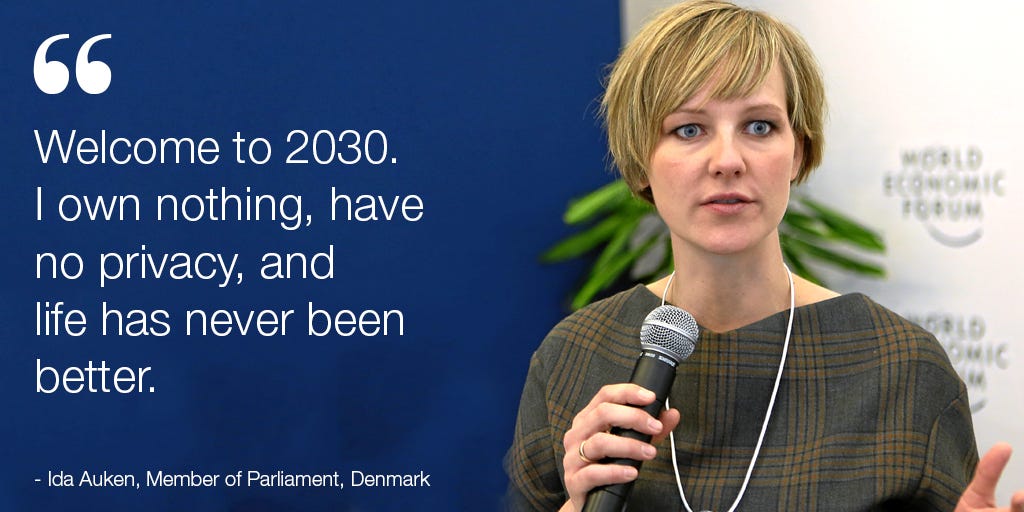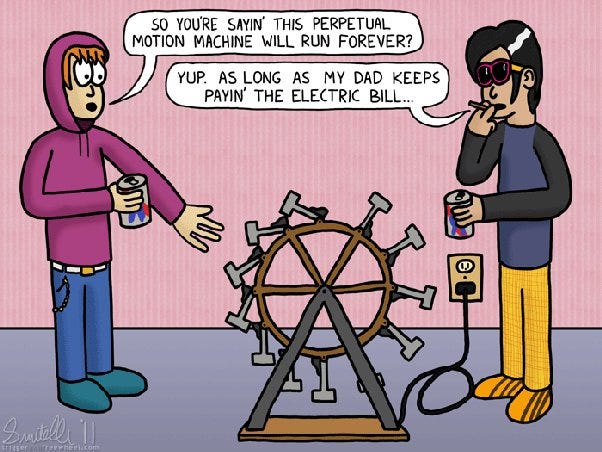The world in 2040 (part 1)
You won't be able to afford anything and you'll be unhappy
In a now infamous article that was originally posted in 2016 on the World Economic Forum website (and subsequently on Forbes) Ida Auken, (then Member of Parliament, Parliament of Denmark) waxed lyrical on their “vision” of how the world would be in 2030. Projecting only 14 years into the future we get to share in this Utopian world in which everything is a “service” obviating the need for ownership. Everything has changed:
We have access to transportation, accommodation, food and all the things we need in our daily lives. One by one all these things became free, so it ended up not making sense for us to own much.
So now all work is done by machines and AI, people are free to enjoy life - read, hike, cook (if they feel like it) and “be creative”.
It is important to note that this was NOT a prediction of the world in 2030, but a thought-experiment, a “scenario” that has often been taken out of context in many memes and articles. Notwithstanding this, it provides an interesting spotlight on the energy-blind wishful-thinking that has informed a lot of policy in the era of decarbonization.
What I am interested in here is the thought process that leads to the idea that everything could be free.
Which is, to say the least, a bit counter-intuitive.
One, Two, Free…
First communication became digitized and free to everyone. Then, when clean energy became free, things started to move quickly. Transportation dropped dramatically in price. It made no sense for us to own cars anymore, because we could call a driverless vehicle or a flying car for longer journeys within minutes.
Let’s read that again…. “Then, when clean energy became free…”
Ah yes, the crazy progressive logic that historical cost decreases in manufacturing of wind and solar can be extrapolated to zero. And why not? The wind and sun are free after all…. if only we could live in harmony with nature and simply harvest the Gaian Bounty.
Despite these five innocuous words (when clean energy became free) being so neutral and barely noticeable lost in the flow of the text, they are critical for all the rest. None of the other parts of this Utopia would be remotely possible or plausible if energy were not imagined to be “free” (let alone “free and clean”).
It’s Deja Vu, again.
The funny thing is that boring older people, who don’t have this kind of “creative vision”, can relate. When I was a schoolboy back in the Middle Jurassic - the idea that machines would replace all jobs was fashionable - this was the world of TV programs like “Tomorrow’s World” - I recall having to write essays imagining a world of no work, all leisure. Which, with hindsight deserves LMAO.
At the same time, Nuclear Energy was seeing a huge surge in capacity - this was the time of “Too Cheap to Meter”1 - “the vast energy stored in 1KG of Uranium….”, etc. - people “got” energy density - but misread the real-world complexity of harnessing all that latent energy.
Nuclear Energy has massive energy density, but requires a lot of management - which pushes costs up firmly into the realm of needing the resulting electricity to be “metered”. Likewise, harnessing the wind and sun requires enormous infrastructure and operating costs, as well as back-up power and ultimately replacement costs. Just like nuclear, renewables will never be “too cheap to meter” - despite what The Guardian readers may like to believe.
Free energy leading to all leisure and no work: we have seen this vision of the future before. It didn’t pan out then and it won’t now. Physics, y’know.
You Will be Happy
As an aside, the idea that having all material needs met and there being no need to work, is a recipe for happiness, is as naïve as the idea that energy will be free. I suspect that the author has not read, or at least not understood Viktor Frankl’s “Man’s Search for Meaning”…. but that is a different discussion.
I “get” that this was a thought experiment, a moon-shot “what-if” - but whilst the creative aspect was surely fun and gratifying for the author, the fact that it “resonated” with many people makes it dangerous.
And as I have noted above - this is just an extension of the widely received idea that renewable energy will be green and cheap, and that the cheapness is an inherent attribute that will continue to improve. This is a powerful idea, and it is one that has created many successful careers (The Merchants of Boom). It is, however, also the same idea that is going to bankrupt major developed economies as they chase this mirage. The only real uncertainty is which one will be first to collapse.
Apagogical Arguments
Whilst I have suggested that the free-energy central tenet of the “2030” article is not visionary, but actually dangerous to real-world policy, we can be grateful to the author.
By pushing the “Greener, Cleaner and Cheaper” mantra to the extreme of “when clean energy became free” (with zero downsides or trade-offs) it is a fantastic example of how to demolish an argument by taking it to its absurd conclusion.
This is Reductio ad absurdum, par excellence…
No wonder the original posts have been scrubbed from the WEF and Forbes websites2; unintentionally, this thought-experiment puts a finger firmly on the painful bit that undermines the Net Zero narrative. Cost.
This may be a case of mistaken identity https://www.nrc.gov/reading-rm/basic-ref/students/history-101/too-cheap-to-meter.html





Glad you found it. Wondering about where she is right now "Ida Margrete Meier Auken is a Danish politician and member of the Folketing for the Social Democrats political party. She has been a member of parliament since 2007. She was Minister for the Environment of Denmark from 2011 to 2014." - I thought only Brazilians forget quickly what politicians do or say but I think was wrong.
Love your work. Vaclav Smil wrote this about the erroneous assumption that energy system follow Moore's Law: https://spectrum.ieee.org/moores-curse